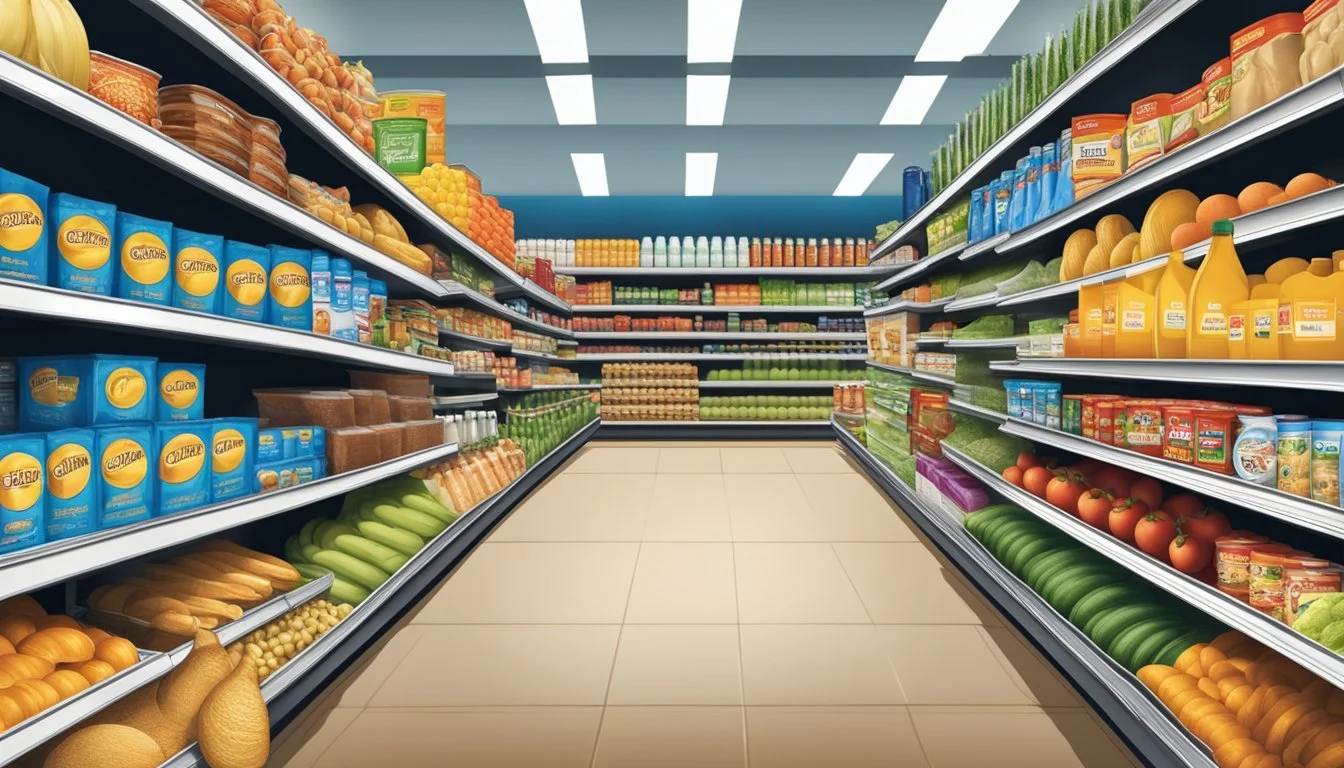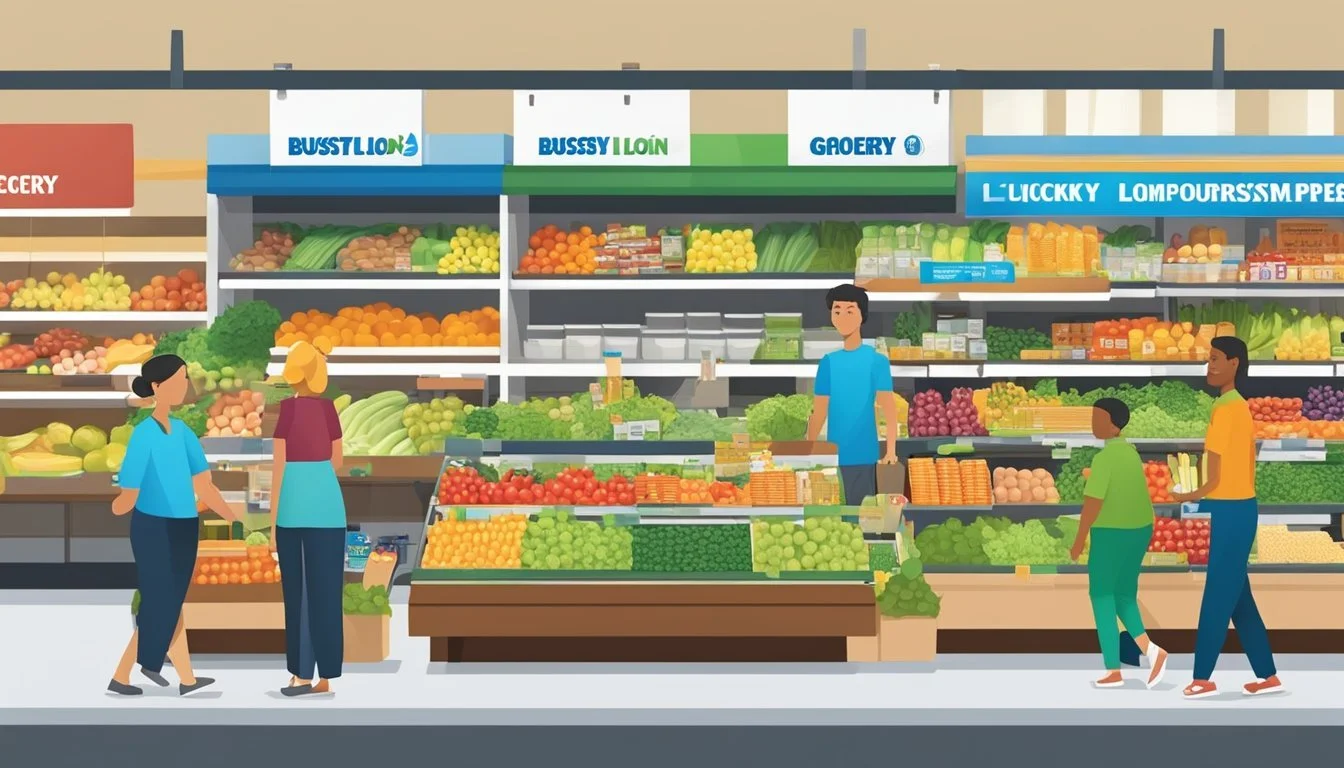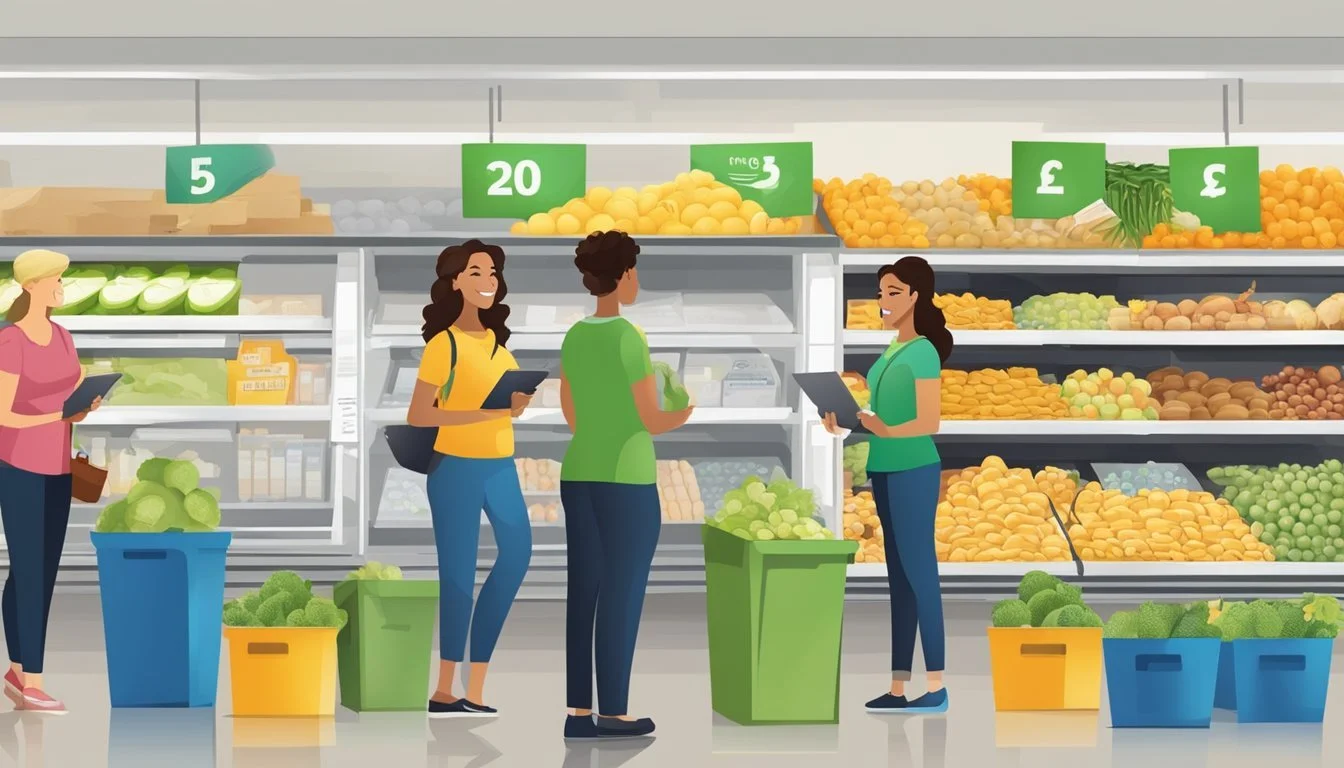Food Lion vs Lucky Supermarkets
A Comprehensive Comparison
Grocery shopping can be a significant part of a household's budget, making the choice of supermarket crucial for many consumers. Food Lion and Lucky Supermarkets are two popular options that cater to different regions and demographics. While Food Lion offers competitive prices and a wide range of store-brand products, Lucky Supermarkets focuses on fresh produce and local offerings.
Both chains have their strengths and weaknesses. Food Lion, with over 1,000 stores across ten states, provides a large selection of affordable store-brand items. Lucky Supermarkets, though smaller in scale, emphasizes quality produce and community engagement. Shoppers' preferences often depend on factors such as price, product variety, and store atmosphere.
Comparing these two grocery stores reveals insights into different retail strategies and consumer priorities. The choice between Food Lion and Lucky Supermarkets ultimately depends on individual needs, location, and shopping habits. Examining their offerings, pricing, and customer experience can help shoppers make informed decisions about where to spend their grocery dollars.
History and Presence
Food Lion and Lucky Supermarkets have distinct histories spanning several decades. Both chains have undergone significant changes in ownership and branding over the years, shaping their current market presence.
Food Lion: Origin and Expansion
Food Lion's roots trace back to 1957 in Salisbury, North Carolina. Founded as Food Town by Wilson Smith, Ralph Ketner, and Brown Ketner, the chain quickly gained traction in the southeastern United States. In 1974, the Belgium-based Delhaize Group acquired Food Town, fueling its growth.
The company rebranded to Food Lion in 1983 to avoid confusion with other similarly named chains. This change marked the beginning of rapid expansion. Food Lion grew to over 1,000 stores by the early 1990s, primarily in the Southeast and Mid-Atlantic regions.
Today, Food Lion operates more than 1,000 stores across 10 southeastern and mid-Atlantic states. The chain is known for its focus on low prices and convenient locations in both urban and rural areas.
Lucky Supermarkets: Brand Evolution
Lucky Supermarkets began its journey in 1935 in San Leandro, California. The chain established itself as a prominent grocery retailer in the western United States, particularly in California.
In 1998, Lucky's parent company, American Stores, was acquired by Albertsons. This acquisition led to the temporary disappearance of the Lucky brand in 1999, as stores were converted to the Albertsons name.
However, the Lucky brand made a comeback in 2006 under new ownership. Save Mart Supermarkets acquired the rights to the Lucky name in Northern California, reviving the brand in select locations.
Currently, Lucky Supermarkets maintains a presence in Northern California, operated by Save Mart Supermarkets. The chain continues to serve customers with a focus on fresh produce and competitive pricing.
Store Brand Comparison
Food Lion and Lucky Supermarkets both offer private label products to provide value options for shoppers. These store brands allow customers to save money while still getting quality groceries.
Private Label Products
Food Lion's private label, "Food Lion Brand," covers a wide range of products across various categories. These items typically cost 20-30% less than national brands while maintaining comparable quality. Food Lion also offers a value tier called "Food Lion Essential Everyday" for even greater savings.
Lucky Supermarkets carries the "Lucky Brand" for its private label offerings. This line includes everything from pantry staples to frozen foods and household items. Lucky Brand products are designed to compete with national brands in terms of quality while providing customers with more affordable options.
Exclusive Brands and Partnerships
Food Lion has partnered with several suppliers to create exclusive brands. These include "Nature's Place" for organic and natural products, and "Taste of Inspirations" for premium foods. These exclusive lines help differentiate Food Lion from competitors and cater to specific consumer preferences.
Lucky Supermarkets, as part of the Save Mart Companies, has access to exclusive brands like "Pacific Coast Selections" for seafood and "Sunny Select" for various grocery items. These brands are tailored to regional tastes and offer unique products not found in other stores.
Product Quality and Selection
Food Lion and Lucky Supermarkets both offer a range of grocery products, but their quality and selection differ in key areas. Each chain has its own strengths when it comes to fresh produce, meat, organic options, and prepared foods.
Freshness of Produce and Meat
Food Lion emphasizes locally sourced produce when possible, which can lead to fresher fruits and vegetables. Their produce sections typically feature a good variety of seasonal items. The chain has made efforts to improve its meat quality in recent years, offering USDA Choice beef and fresh poultry.
Lucky Supermarkets, part of the Save Mart company, is known for its extensive produce departments. They often carry a wider selection of exotic and specialty fruits and vegetables. Lucky's meat counters generally offer a good range of cuts and types, including some higher-end options.
Both stores have implemented freshness guarantees, but Lucky tends to edge out Food Lion in overall produce quality and variety.
Availability of Organic and Prepared Foods
Food Lion has expanded its organic offerings in recent years, particularly through its Nature's Promise brand. However, the selection can be limited compared to larger chains. Their prepared foods section is typically basic, with a focus on rotisserie chickens and pre-made sandwiches.
Lucky Supermarkets generally boasts a more extensive organic section, including both national brands and their own organic line. They often feature larger prepared foods departments with hot bars, salad bars, and a wider variety of ready-to-eat meals.
Lucky tends to offer more options in both organic and prepared foods categories, catering to customers seeking convenience and health-conscious choices.
Variety of Grocery Items
Food Lion focuses on providing essential grocery items at competitive prices. Their store brand, Food Lion, covers many product categories and offers good value. The overall selection can be more limited compared to larger supermarkets.
Lucky Supermarkets typically carry a broader range of national brands alongside their store brands. They often feature more specialty and gourmet items, as well as a wider variety of international foods.
Lucky generally offers a more diverse selection of grocery items, appealing to shoppers looking for unique or specialty products. Food Lion's selection is more streamlined, focusing on everyday essentials.
Price and Value Assessment
Food Lion and Lucky Supermarkets employ different pricing strategies to attract customers. Their approaches to discounts and sales vary, as does their positioning relative to other major grocery chains.
Pricing Strategies
Food Lion focuses on everyday low prices across its product range. The chain aims to keep costs down through efficient operations and a no-frills store experience. Lucky Supermarkets takes a different approach, offering competitive prices on select items while maintaining higher margins on others.
Food Lion's strategy results in prices approximately 10-12% below average, potentially saving a family $1,300-$1,560 annually on a $250 weekly grocery budget.
Lucky Supermarkets' pricing is more variable, with deep discounts on featured items but higher prices elsewhere in the store.
Discounts and Sale Prices
Food Lion runs weekly specials and offers a loyalty program for additional savings. The chain frequently promotes buy-one-get-one deals on popular items. Digital coupons are available through their app.
Lucky Supermarkets relies more heavily on promotional pricing. They offer larger discounts on select products each week to drive traffic. Lucky's loyalty program provides personalized offers based on shopping history.
Both chains match manufacturers' coupons, but Lucky tends to have more generous doubling policies.
Comparison with Other Grocery Chains
Food Lion's pricing is competitive among major chains. It typically offers lower prices than traditional supermarkets but is slightly more expensive than Walmart. A typical basket at Food Lion costs about 5% more than at Walmart.
Lucky Supermarkets' overall pricing falls in the middle range for grocery chains. Their prices are generally higher than discount stores like Aldi but lower than upscale markets.
Neither chain matches the bulk pricing of Costco, but both offer better everyday prices on smaller quantities. For weekly shopping, Food Lion tends to be more consistently affordable than Lucky Supermarkets.
Customer Experience
Food Lion and Lucky Supermarkets differ in their approaches to customer experience. Both chains prioritize shopper satisfaction, but implement distinct strategies to achieve this goal.
Store Layout and Navigability
Food Lion emphasizes a straightforward layout designed for efficiency. Wide aisles and clear signage help customers locate items quickly. The store's organization typically follows a logical flow, with produce near the entrance and staples like bread and milk towards the back.
Lucky Supermarkets, on the other hand, often features a more diverse layout. Their stores may incorporate specialized sections for ethnic foods or gourmet items. This can create a more exploratory shopping experience, though it may require more time to navigate.
Both chains generally group similar products together, aiding in comparison shopping. Food Lion tends to maintain a consistent layout across locations, while Lucky Supermarkets may vary more between stores.
Check-Out Efficiency
Food Lion invests in technology to streamline the check-out process. Many locations offer self-checkout options, reducing wait times during busy periods. Their stores typically maintain an adequate number of staffed lanes to handle customer flow.
Lucky Supermarkets also provides self-checkout kiosks in many stores. They often employ a "next in line" system to direct customers to available registers efficiently. Both chains train cashiers to process transactions quickly and accurately.
During peak hours, Food Lion may open additional lanes to minimize queues. Lucky Supermarkets sometimes uses baggers to expedite the checkout process, especially for larger orders.
Cleanliness and Store Maintenance
Food Lion places a strong emphasis on store cleanliness. Regular cleaning schedules ensure floors are swept and spills are promptly addressed. Their produce sections are typically well-maintained, with fresh items rotated frequently.
Lucky Supermarkets also prioritizes cleanliness, but customer experiences may vary more between locations. Both chains generally keep restrooms clean and stocked. Food Lion often uses brighter lighting, which can make stores appear cleaner and more inviting.
Store brands at both chains are prominently displayed and well-organized. Food Lion's private label products are usually easy to identify, while Lucky Supermarkets may integrate their store brands more subtly alongside national brands.
Additional Services
Food Lion and Lucky Supermarkets offer various services beyond basic grocery shopping to enhance customer convenience and loyalty. These include delivery options and rewards programs tailored to frequent shoppers.
Grocery Delivery Options
Food Lion partners with Instacart to provide home delivery in many areas. Customers can order groceries online or through the Food Lion To-Go app. Same-day delivery is available in select locations.
Lucky Supermarkets also offers grocery delivery through third-party services like Instacart and DoorDash. Delivery areas and times may vary by store location.
Both chains allow customers to shop their full product selection for delivery, including fresh produce, meat, dairy, and pantry staples.
Loyalty Programs
Food Lion's MVP Card program provides exclusive weekly specials and personalized coupons to members. Shoppers earn points on purchases that can be redeemed for discounts on groceries and gas.
Lucky Supermarkets offers the Lucky You rewards program. Members receive digital coupons, earn points on purchases, and access special promotions. The program includes a mobile app for easy savings tracking.
Both loyalty programs are free to join and aim to reward frequent shoppers with savings opportunities. Members typically enjoy lower prices on select items compared to non-members.
Customer Ratings and Surveys
Food Lion and Lucky Supermarkets have been evaluated through various customer ratings and surveys. These assessments provide valuable insights into shopper experiences and preferences at both grocery chains.
Consumer Reports Findings
Consumer Reports conducted a comprehensive supermarket survey in 2018, gathering responses from over 75,000 members. The survey assessed various aspects of grocery shopping experiences. Food Lion received mixed ratings in this evaluation.
Customers praised Food Lion for its competitive pricing and convenient locations. However, the chain scored lower in areas such as product quality and store cleanliness compared to some competitors.
Lucky Supermarkets was not specifically mentioned in the Consumer Reports survey results. This may be due to its regional presence or limited market share at the time of the study.
Survey Data and Customer Feedback
Independent surveys and customer feedback platforms offer additional perspectives on Food Lion and Lucky Supermarkets. Food Lion has made efforts to improve customer satisfaction in recent years.
The chain's loyalty program receives positive mentions from shoppers. Customers appreciate the personalized deals and savings opportunities it provides.
Lucky Supermarkets, while less prominent in national surveys, maintains a loyal customer base in its operating areas. Local feedback often highlights the chain's community involvement and personalized service.
Online reviews for both stores tend to vary by location. Shoppers frequently comment on factors such as produce freshness, staff friendliness, and checkout efficiency.
Geographical and Demographic Reach
Food Lion and Lucky Supermarkets operate in distinct regions of the United States, targeting different customer bases. Their geographical footprints and demographic focuses shape their strategies and market positions.
Regional Dominance and Store Accessibility
Food Lion maintains a strong presence on the East Coast, with approximately 1,100 stores across 10 states. Its footprint stretches from Delaware to Georgia, with a concentration in the Mid-Atlantic and Southeastern regions. This regional focus allows Food Lion to tailor its offerings to local preferences and compete effectively against other chains like ALDI, Lidl, and Winn-Dixie.
Lucky Supermarkets, in contrast, operates primarily in Northern California. With fewer stores than Food Lion, Lucky focuses on serving urban and suburban areas in the San Francisco Bay Area and surrounding regions.
Target Demographics
Food Lion aims to attract budget-conscious shoppers, particularly Millennials. The chain's popularity among this demographic exceeds that of many other grocery stores. Food Lion's strategy involves offering competitive prices and convenient locations to appeal to younger, value-seeking customers.
Lucky Supermarkets targets a diverse customer base in Northern California. The chain caters to the region's multicultural population, offering a wide variety of ethnic foods and products. Lucky's approach focuses on meeting the needs of urban and suburban families, working professionals, and health-conscious consumers in its service areas.
Conclusion
Food Lion and Lucky Supermarkets each offer distinct advantages for grocery shoppers. Food Lion stands out for its competitive pricing and extensive store brand options. The chain's private label products provide good value while maintaining quality.
Lucky Supermarkets excels in fresh produce selection and overall store ambiance. Their focus on local and organic offerings appeals to health-conscious consumers. The chain also receives praise for its customer service.
Both stores aim to meet diverse shopper needs through their product assortments. Food Lion emphasizes affordability, while Lucky targets those seeking premium and specialty items. Ultimately, the better choice depends on individual priorities and preferences.
Price-sensitive shoppers may find Food Lion more appealing. Those valuing product variety and shopping experience might prefer Lucky. Both chains continue to adapt to evolving consumer demands in the competitive grocery landscape.
Store location and convenience also play a role in consumer choice. Food Lion has a larger presence in certain regions, while Lucky operates in more limited areas. Shoppers should consider which chain best serves their local community.
In the end, both Food Lion and Lucky Supermarkets strive to provide quality products and positive shopping experiences. Each has its strengths, catering to different segments of the grocery market.









